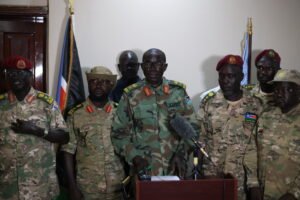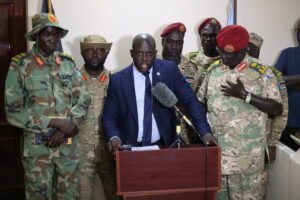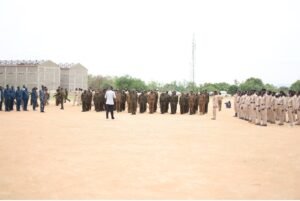By William Madouk
There was a mass exodus from the Sudan People’s Liberation Movement in Opposition (SPLA-IO) Under Dr. Riek Machar to the South Sudan People’s Defense Forces (SSPDF) under President Salva Kiir.
About one thousand one hundred and four (1,104) SPLA-IO personnel based in Western and Eastern Equatoria, including various training centers in Juba, Bahr el Ghazal, and Jonglei, joined SSPDF.
Brig-Gen. Gabriel Bol Anuer, the ex–commander for mobilization and organization for SPLA-IO in the Bahr el Ghazal region, declared that he and 500 forces abandoned Dr. Machar for the SSPDF.
“I, Brig-Gen. Gabriel Bol Anuer, serving as the commander for mobilization & organization in SPLA-IO, officially declares on behalf of the forces under my command our withdrawal from the SPLA-IO faction led by Dr. Riek Machar. And fully align ourselves with the South Sudan People’s Defense Forces (SSPDF) under the esteemed leadership of Gen. Slava Kiir Mayardit,” said Anuer
He alleged that their defection was because of the politicization of the implementation of the security arrangement by the SPLM/A-IO.
Also, Gen Anuer cited targeted killing and torture of non-Nuer members in Machar’s faction as another reason, specifically in the Wunaliet cantonment, where 48 officers were tortured and dehumanized.
“Lastly, I declare my allegiance and that of the other forces over 500 soldiers under my command once again, to the wise leadership of H.E Gen Salva Kiir, President of the Republic of South Sudan, Commander in Chief of SSPDF, and Supreme Commander of all other organized forces. As we pledge our allegiance to the SSPDF and its leadership under the wise leadership of H.E Gen Salva Kiir Mayardit, we are committed to working tirelessly toward the objective of peace, security and stability,” he noted.

Brig-Gen. Compeo Andrea Matia, who also led 500 SPLA-IO personnel [photo by William Madouk]
“SPLA-IO movement has lost direction Dr. Riek Machar deceived us that we were fighting a just war for reform, however, we have now realized that we were wasting our time fighting a meaningless war to keep Dr. Riek Machar and his family in power,” Said Matia.
The group cited persistent tribalism, nepotism, and lack of direction in SPLA-IO as reasons for their defections.
“We are ready to cooperate with the state government to restore peace and the security for our people and ready to support president Salva Kiir Mayardit. The integration of our forces into SSPDF will be a role model, will be an example to those who are still hanging out there to join in and be organized.” Matia added.
He added that SPLA-IO leadership only prioritizes personal gains over the welfare of soldiers and citizens.

David John Kumuri, spokesman for South Sudan’s National Security Service (NSS) [photo by William Madouk]
“The received forces were based in Western Equatoria State and Eastern Equatoria State respectively, with latter having comprised of 55, while the former comprised 549 each, making a total of 604 forces all together,” he said.
He said their reintegration into the SSPDF was crucial for stability, adding that widow are still open for forces who are still willing to join SSPDF.

Some of the defected soldiers from SPLA-IO in a parade in Lologo (William Madouk)
“Finally, the National Security Service guarantees that the ongoing reception of the holdout forces, including the SPLA-IO forces, is constructive and central to peace and tranquility of the Republic of South Sudan and its people,” Kumuri added.
The SPLA-IO’s spokesperson, Col Lam Paul Gabriel, and Puok Both Baluang, the Acting press sectary in the office of Dr. Riek Machar, were not successful by the press time.
This is the third such defection announced by the NSS since tensions rose following clashes in the town of Nasir last month.
The move comes amid heightened political tensions, including the recent house arrest of SPLM/A-IO leader and First Vice-President Riek Machar.
Analysts say the defections could weaken the opposition SPLA-IO while strengthening President Kiir’s grip on the military.
The fragile 2018 peace deal between President Salva Kiir and First Vice President Riek Machar faces challenges due to delayed security reforms and political disputes.



